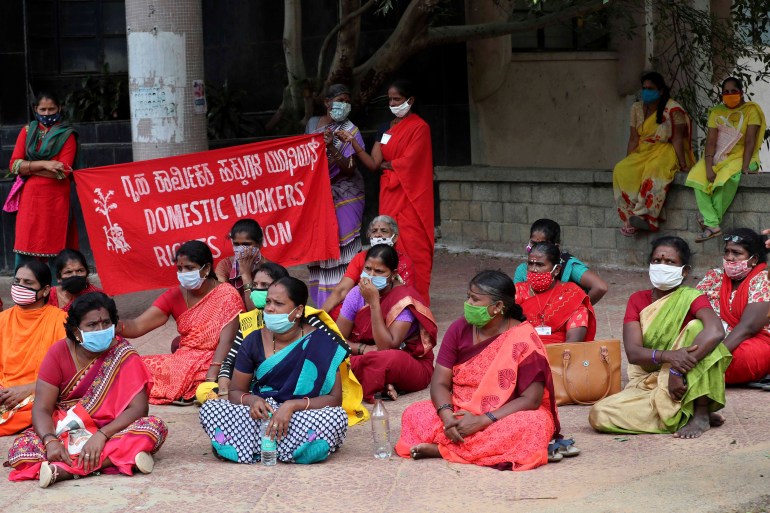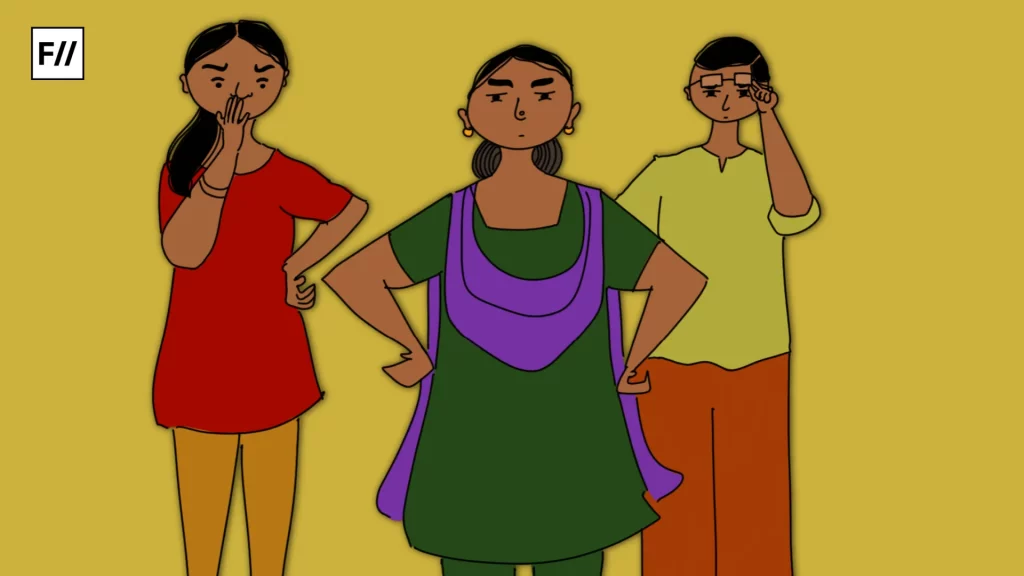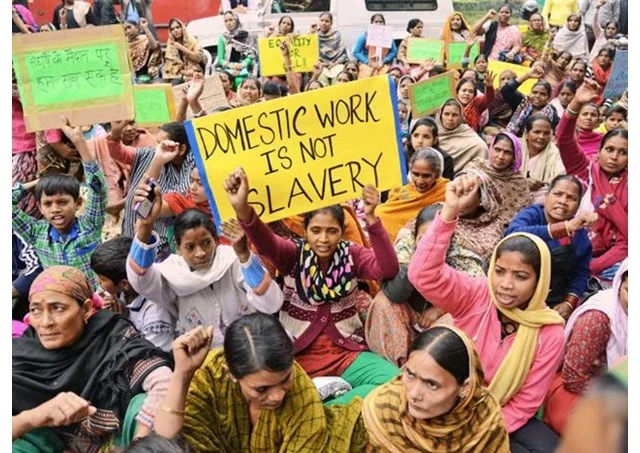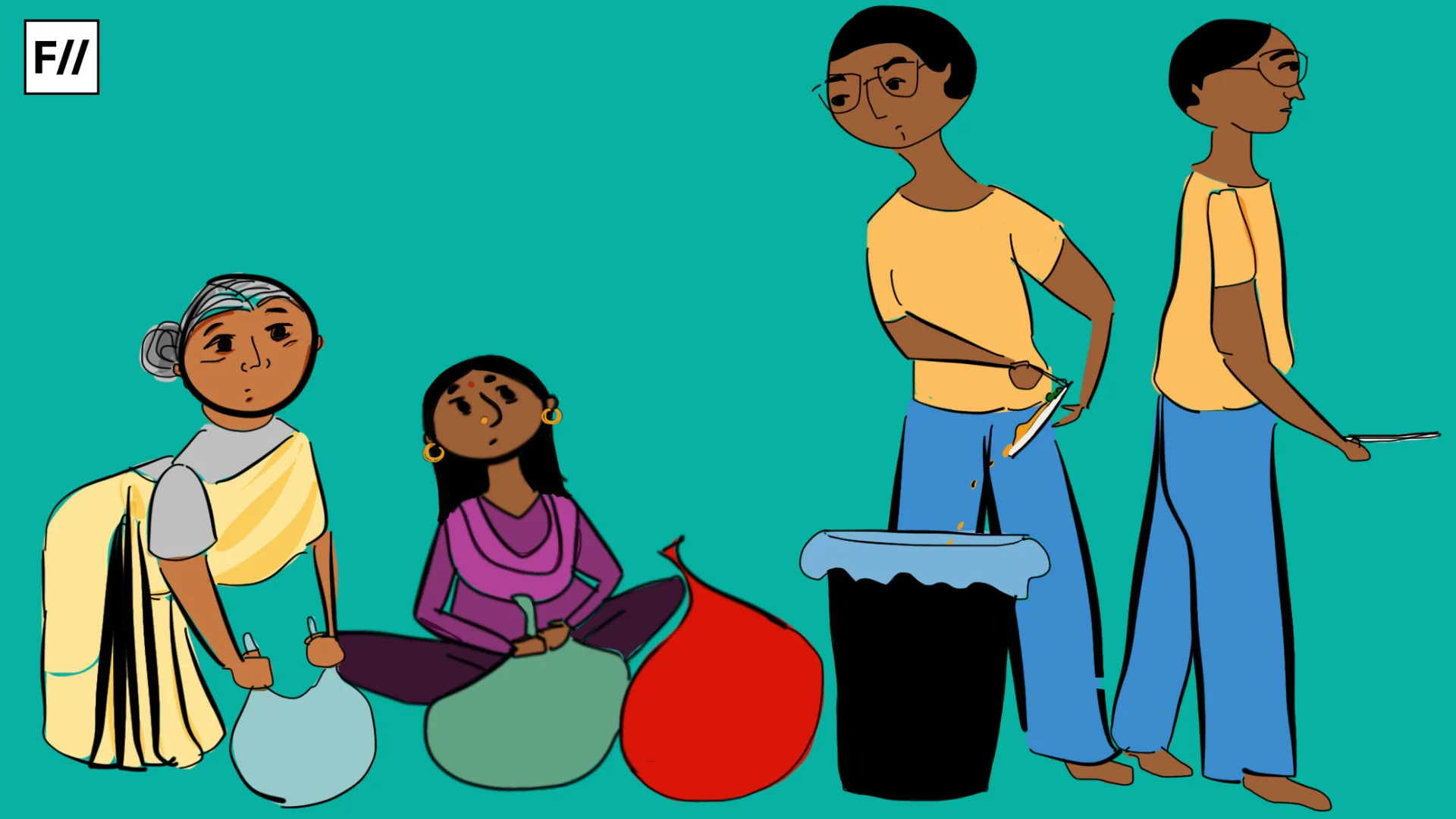When a 14-year-old girl was rescued from a Delhi suburb in February 2023 by the police and social workers, what came out was a picture of shock and horror, revealing the face of the invisible abuse and exploitation endured by domestic workers in India. Subjected to cut and burn injuries inflicted by a blade and a hot tong, her first-hand account revealed being mercilessly tortured by her employers based in profitable firms in Delhi. The girl’s distressing account also revealed how she was forced to “strip off her clothes” while doing household chores and forced to sleep naked on the floor. Despite the grievous degree of abuse, the slothful legislative progress granting exclusive protection to this vulnerable segment of the population meant that a case was registered solely under the POCSO Act by the police.
Plight of domestic workers
This isn’t the only account of the mistreatment and repeated abuse inflicted on domestic workers in India, with a similar incident resurfacing in 2025 when a domestic worker in Delhi, working for 28 years, was accused of theft by one of her employers and beaten ruthlessly in public, while also being denied her pay. Most of these domestic workers are migrants from regionally backward areas who belong to Dalit groups entrenched at the bottom of the social hierarchy. The unfair treatment meted out to them is rooted in the ancient institution of caste-slavery. The inherent superiority complex embedded in the mindset of the employer who belongs to the upper crust of society inevitably results in discrimination against the domestic workforce of India, which is the backbone of nearly half the invisible labour of the economy.

As per official estimates, the BBC notes that India has nearly three million domestic workers. Statistics by the International Labour Organisation, however, estimate these figures to be somewhere between 20 and 30 million. Despite their critical role in sustaining families, societies, and economies, their caregiving services are often undervalued, underpaid, and under-represented.
When a 14-year-old girl was rescued from a Delhi suburb in February 2023 by the police and social workers, what came out was a picture of shock and horror, revealing the face of the invisible abuse and exploitation endured by domestic workers in India. Subjected to cut and burn injuries inflicted by a blade and a hot tong, her first-hand account revealed being mercilessly tortured by her employers based in profitable firms in Delhi.
Historian Shireen Moosvi, in her work, documents the precolonial roots of domestic labour in India, dating back to the Manusmriti, which describes these services as the “dog’s mode of life.” Caste-based occupational segregation combined with lower chances of social mobility led to a shrinkage of the natural rights of domestic workers, reflected in the theory of “pollution”. The economic changes brought about by liberalisation and globalisation expedited exploitation further as the class divide sharpened and the share of the top 10 percent in income nearly doubled. The high economic growth accompanied by starker economic inequality led to a flux in migration from rural areas as more people flocked to urban cities in the hope of better living conditions.
Stripped dignity and vulnerable conditions
The unique and complicated nature of domestic work is a significant barrier to any potential legislative reform, coupled with deep-rooted collective social apathy and ignorance. Rishi Kant, a spokesperson for Shakti Vahini, says, ‘Because of extreme poverty, girls drop out of school on hitting puberty. They’re then lured with promises of jobs in Delhi and other cities by dodgy employment agencies that are not registered. In the city, they are placed in homes of people, where they are often in exploitative situations. Many are assaulted; they have few freedoms.‘

The coronavirus-induced lockdown in India, which compelled the middle class to manage without domestic workers, exposed the high degree of dependence these affluent households have on them — the vicious cycle of poverty and cheap labour prospects combine to fuel the exploitation further. Lack of awareness and legal reform, along with the collective social ignorance and indifference, imperil the conditions even more, aggravating abuse and hampering their dignity.
Legal inaction leaves domesitc workers at the mercy of employers
On January 29 2025, the Supreme Court, aggrieved by the years of abuse faced by an impoverished tribal woman from Chattisgarh, directed four ministries—labour, social justice, women and child development, and law and justice—to create a joint committee to “consider the desirability of recommending a legal framework for the benefit, protection and regulation of the rights of domestic workers”. Despite judicial intervention, no meaningful progress has been made in the direction of safeguarding the domestic workers. The undocumented nature of domestic work renders it invisible, impeding the creation of a unified labour law for legal protection, making them susceptible to violence.
Ever since the creation of the first bill in 1959, separate bills have been introduced in the parliament in 1972, 1977, 1989, 2004, 2008, 2015, 2016, and 2017, but none have been successfully implemented due to a lack of political goodwill. The state governments are mandated under the Unorganised Workers’ Social Security Act, 2008, to formulate suitable welfare schemes for the unorganised sector workers, including domestic workers, relating to provident fund, employment injury benefits, housing, education schemes for children, skill upgradation of workers, financial assistance, and old age homes.
On January 29 2025, the Supreme Court, aggrieved by the years of abuse faced by an impoverished tribal woman from Chattisgarh, directed four ministries—labour, social justice, women and child development, and law and justice—to create a joint committee to “consider the desirability of recommending a legal framework for the benefit, protection and regulation of the rights of domestic workers”. Despite judicial intervention, no meaningful progress has been made in the direction of safeguarding the domestic workers.
A national policy created in 2019 aimed at registering domestic workers under labour laws could never be implemented, despite its positive intent. As noted by Sonia George, a member of SEWA, who was also a part of the drafting committee, the policy was “ one of the most comprehensive policies for domestic workers”, yet it could never see the light of day. As per the Ministry of Labour and Employment, the implementation of the policy could mean registration for domestic workers, the right to form their own associations, and access to social security and courts of tribunal, along with other provisions, yet its non-implementation leaves their futures hanging.
Legislative reform constitutes the binary foundation for any structural change. The legal lacunae, in turn, mean that India’s vast array of domestic workers must rely on employer goodwill for respectable remuneration and decent treatment.
Gigification of domestic workers’ abuse—Insta Help and vicious cycle
Insta Help, marketed by the parent Urban Company as an instant lifesaver providing domestic help within a span of 15 minutes, aggravates exploitation, threatening wage security and the probability of abuse. Advertised at a rate of 49 INR per month, the service turns its services into a commodity. Already reeling under gruesome working hours, employment insecurity, wage deficit, and harassment, the service exposes the dark facade of the capitalism gig that “imperils the imperilled” even more. The caste-class realities also seep into the exclusionary behaviour meted out to them through the maintenance of separate utensils and seating furniture.

Further, the process of hiring, facilitated by technology, means that professional etiquette and similar qualities receive precedence, excluding illiterate workers. It rebrands domestic work as a professional service, condensing the scope for reform, where the real beneficiary is the platform, while domestic workers are just agents of the process of abuse at the hands of gigification.
The economic and social realities are harsh, and the structural omission of domestic labourers from the prevailing labour laws pushes them to the margins of society, confining most stories of abuse and violence within the private walls of the home. Domestic services are vital to any economy, yet their invisibilisation and undervaluation are symptomatic of a deeper problem demanding legal and structural reform for the restoration of dignity.
About the author(s)
Nausheen is currently an undergraduate student pursuing journalism at Lady Shri Ram College for Women, Delhi University. With a keen interest in feminism, geopolitics, and social issues, her passions lie in research, writing, and public speaking. In her free time, she enjoys listening to music, sipping coffee, and playing chess.





